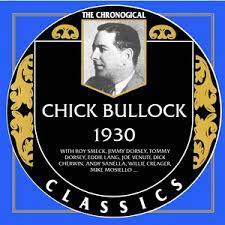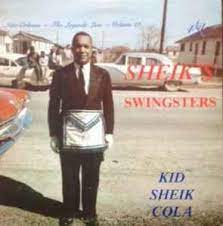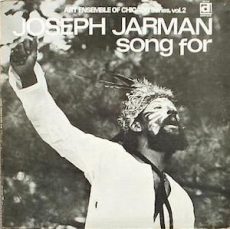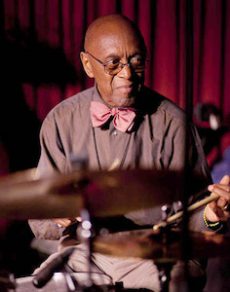
Daily Dose Of Jazz…
Charles Bullock, known in the industry as Chick, was born on September 16, 1898 in Montana to immigrants from England.. He belonged to a select group of mostly freelance vocalists who sang the vocal refrains on hundreds of New York sessions, which included Smith Ballew, Scrappy Lambert, Irving Kaufman, Arthur Fields, and Dick Robertson. Some of these vocalists were also musicians leading bands, but their singing was more often featured.
Though he began his career in vaudeville and sang in movie palaces, he rarely performed live because his face was disfigured due to an eye disease. His career as a studio musician took off in the late 1920s, and in the 1930s he sang with musicians such as Duke Ellington, Luis Russell, Cab Calloway, Bunny Berigan, Bill Coleman, Jack Teagarden, Tommy Dorsey, Jimmy Dorsey, Joe Venuti, and Eddie Lang.
Bullock’s recordings proved so popular that he used pseudonyms for some recordings, including the name Sleepy Hall. However, in the 1940s the World War II recording ban essentially ended Bullock’s career and he quit the music business in 1942. He moved to California in 1946 and took up real estate, opening his own company.
Chick was mostly associated with the ARC group of labels including Melotone, Perfect, Banner, Oriole, and Romeo. Many of his records were issued under the name Chick Bullock and his Levee Loungers.
Jazz and dance band vocalist Chick Bullock, who recorded some 500 tunes over the course of his career, transitioned on September 15, 1981, in California at the age of 82.
More Posts: bandleader,history,instrumental,jazz,music,vocal

The Jazz Voyager
Last week the Jazz Voyager was in Nashville checking out Rudy’s Jazz Room and had a great experience. This week he’s on his way and looking forward to another wonderful experience in Kansas City, Missouri at The Black Dolphin located at 1813 Grand Boulevard. Planning to catch an early set with the Tim Whitmer Quartet, I’ll be hanging around for the late hit by the Reyes Brothers Trio, both on Friday night..
Depending on which set you catch you can dine in or eat beforehand and then enjoy a full bar of cocktails, mocktails, wine and beer. The first set begins at 6:30~9:30pm followed by the second set 10:00pm ~ 1:00am. Rated $$, come and enjoy an evening of good music. For additional information, the number is 816-215-2954.
More Posts: adventure,album,club,festival,genius,jazz,museum,music,piano,preserving,restaurant,travel

Daily Dose Of Jazz…
George Colar, better known as Kid Sheik or Kid Sheik Cola, was born on September 15, 1908 in New Orleans, Louisiana. In his youth he started playing blues piano around 1920, but took up trumpet after being inspired by and taking lessons from Wooden Joe Nicholas and Chris Kelly for whom he sat in from time to time. During this period he briefly had a band of his own.
In the Thirties he played second trumpet with Buddy Petit, marched with Kid René’s band and from 1952 was a member of the Eureka Brass Band. He worked with George Lewis in the mid-1940s. His Gin Mill Blues is considered a nice fish fries boogie.
Over the years, Kid Sheik performed with many jazz notables, including Harold Dejan’s Olympia Brass Band and Louis Armstrong. By the 1960s he had his own band. He was still blowing strong in New Orleans in 1970.
Kid Sheik was the subject of the official New Orleans Jazz & Heritage Festival poster in 1990. He is featured in a 35mm twelve-minute black and white film directed by Frank Decola titled The Cradle Is Rocking, a copy of which is in the Folkstreams Collection in the Southern Folklife Collection of the Wilson Library at the University of North Carolina in Chapel Hill.
He is most associated with Dixieland jazz and was a long-term performer with the Preservation Hall Jazz Band. In his later years, he married pianist Sadie Goodson. Trumpeter Kid Sheik Cola, who got his nickname from his chic style of dress, transitioned on November 7, 1996.
More Posts: bandleader,composer,history,instrumental,jazz,music,trumpet

Daily Dose Of Jazz…
Joseph Jarman was born on September 14, 1937 in Pine Bluff, Arkansas, and grew up in Chicago, Illinois. At DuSable High School, he studied drums with Walter Dyett, switching to saxophone and clarinet when he joined the United States Army after graduation. During his time there, he was part of the 11th Airborne Division Band for a year.
After his discharge in 1958, Jarman attended Wilson Junior College, where he met bassist Malachi Favors Maghostut and saxophonists Roscoe Mitchell, Henry Threadgill, and Anthony Braxton. These men would often perform long jam sessions at the suggestion of their professor, Richard Wang. Mitchell introduced Jarman to pianist Muhal Richard Abrams, and Jarman, Mitchell, and Maghostut joined Abrams’ Experimental Band, a private, non-performing ensemble, when that group was founded in 1961. The same group of musicians along with Fred Anderson and Phil Cohran went on to found the Association for the Advancement of Creative Musicians (AACM) in 1965,.
His solo recording career began at this time, putting together a sextet, however, Jarman disbanded the group in 1969 after the passing of two members. He had joined Mitchell, Maghostut and Lester Bowie in the Roscoe Mitchell Art Ensemble which would eventually become known as the Art Ensemble of Chicago. The group was known for being costumed on stage for different reasons.
The group moved to Paris in 1969, and lived there for many years in a commune that included Steve McCall, the drummer who went on to form the jazz trio Air. Moving back to Chicago in the 1970s, Joseph lived in a musicians’ building in Hyde Park, with Malachi Favors as his roommate. In 1983, he moved to Brooklyn, New York.
Jarman left the Ensemble until 1993 to focus on his spiritual practice, and didn’t return to music until 1996, releasing two albums and then joining a trio with Myra Melford in Chicago, which would eventually be called Equal Interest.
Along with the saxophone and clarinet, Jarman also played (and recorded on) nearly every member of the woodwind family, as well as a wide variety of percussion instruments. Aside from his work with relatively traditional jazz line-ups, he also composed for larger orchestras and created multimedia pieces for musicians and dancers.
Saxophonist, composer, and poet Joseph Jarman transitioned from respiratory failure at the Lillian Booth Actors Home in Englewood, New Jersey on January 9, 2019. He was 81.
More Posts: bandleader,composer,history,instrumental,jazz,music,poet,saxophone

Three Wishes
Nica’s curiosity never got the best of her mission to discover the wishes of her guests and when she asked Albert “Tootie” Heath of his three wishes he responded with:
- “Being in more than one place at once.”
- “Being able to do anything I want to do on my instrument.”
- “Happiness.”
*Excerpt from Three Wishes: An Intimate Look at Jazz Greats ~ Compiled and Photographed by Pannonica de Koenigswarter
More Posts: baroness,drums,history,instrumental,jazz,music,pannonica,three,wishes



